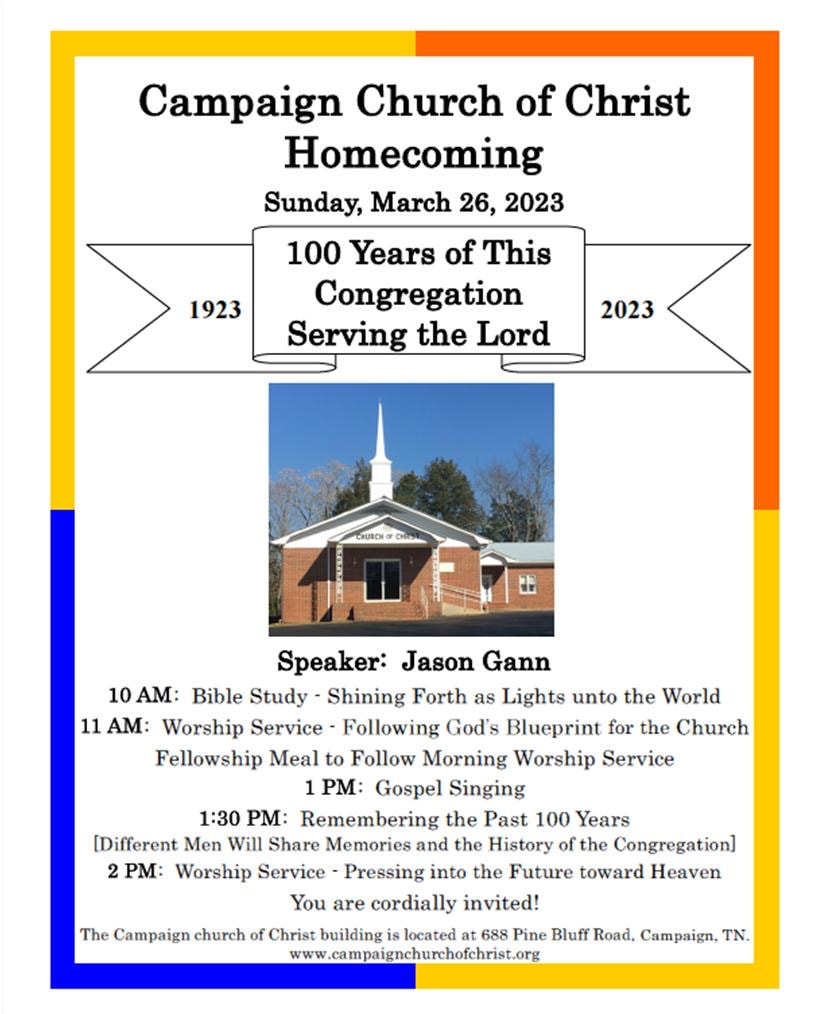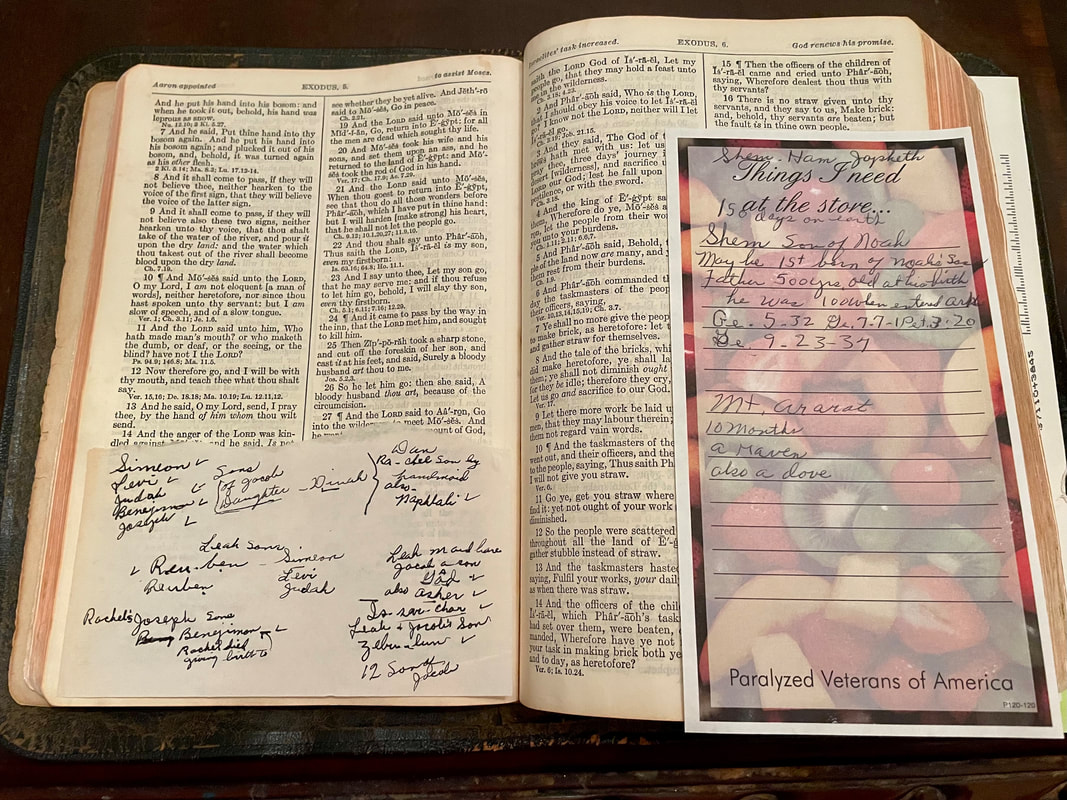What Are Some Specific Examples of Immodesty, and How Do We Dress Ourselves Appropriately For God?5/1/2024  It’s getting hot outside, and when this happens, it is a common occurrence to see more people wearing less. Modesty, or the lack thereof, is a major issue today, especially during the warm months. How we dress directly reflects where our heart is. Being dressed immodestly, shows others that following the social norms of this sinful world is more important than dressing in the manner God wants us to dress. Being immodestly dressed is presented as stylish and “the norm” to both young people and adults alike. How we are viewed by others has largely to do with our outward appearance. Does our outward appearance show that we are followers of Christ, or followers of the world? Do our choice of clothing put the focus on our bodies or Christ? What example do we give others through the way we dress? This is especially true of our young ladies, who can teach other young ladies to be more like Christ through their example. For instance, a young lady can teach other girls to be more modest, by being modestly dressed herself. The problem of immodesty is becoming more and more prevalent as time goes by, and we must teach our young women and men to reflect God always in their attire. What is modest is exemplified by how God clothed Adam and Eve after they realized they were naked. Genesis 3:21 says, “Unto Adam also and to his wife did the LORD God make coats of skins and clothed them.” He clothed them in coats of skins that covered them from their shoulders to their knees, according to the Hebrew word “kethoneth” which can mean “coat” as used here, and it also means “tunic.” A tunic in the Bible was a garment that reached from the shoulders to at least the knees. Since this is the ONLY example given in the Bible of how God wants us to dress, then wearing anything less today would be immodest. The Bible speaks against exposing our chest, loins, and thighs, and showing any of these body parts is considered “naked” in the Bible. We would be considered naked if we exposed any of these parts while either standing or sitting. So while it is important that we make sure that our bodies are covered from the shoulders to the knees while we are standing, it is also important to make sure that we are covered in the same way while sitting down as well. I know that when wearing a skirt or shorts that reach just at the knees while standing, it is easy to forget that this same garment will raise up a little and expose the thighs when sitting, so that is why we must make sure that everything is modestly covered in any position we are in. I Timothy 2:9 still says, “In like manner also, that women adorn themselves in modest apparel, with shamefacedness and sobriety; not with broided hair, or gold, or pearls, or costly array;”. Being immodest not only applies to wearing too little but wearing too much. Wearing overly flashy clothing, overly flashy jewelry, or too much makeup can also be considered immodest because a person who dresses in this manner is concerned about attracting the attention of others. Being immodestly dressed from wearing too little or too much, places a stumbling block in front of others by either tempting them to lust or tempting them to dress the same. We should always make sure that we allow people to see more of Christ in our outward and inward appearance and less of us and the influences of the sinful world in which we live. Modesty is not only for women. Men should also make sure that they are covered from the shoulders to the knees. This principle applies no matter where a person is. So, no matter if a man or woman is shopping in a store, going to church services, or at the beach, they should always be covered from the shoulders to the knees. Anything less than this is considered naked and immodest by God. Examples of what the Bible considers naked can be read in Genesis 3:11; Exodus 28:40-43; Isaiah 47:2-3; and John 21:7; What type of specific garments would be considered immodest? As said earlier in this article, any garment that exposes a person’s body between the shoulders and the knees is immodest. This applies to any garment worn out in public. Examples of immodest apparel would include, men going shirtless, or wearing shorts that expose skin above the knees in public. It would also include women wearing bikinis, bathing suits, shorts and skirts that expose skin above the knees, and any tops that expose a woman’s bosom in any way in public. Tops that expose the shoulders would also be considered immodest, since we are to be covered from the shoulders to the knees. Clothes that are too tight are also immodest. As a woman, I know that finding modest clothing can be a challenge at times, but modest clothes are out there for men and women of all heights, shapes, and sizes. It just takes the dedication to find modest apparel instead of settling for clothes that are “in style,” but not necessarily modest. Being modestly dressed is much more important than being considered “fashionable” by the world. It is good to start teaching young boys and girls to be modest before they reach the age of accountability, so that, when they reach the age of accountability, they will be already equipped with the knowledge of how they should dress. They will also be more likely to make a habit of dressing modestly throughout their lives. I hope that this article helps readers learn more about the importance of modesty and what type of clothes are considered immodest by God. I know that when I was growing up, I heard several sermons about modesty, but preachers rarely got specific about what type of garments would be considered immodest. I have strived to teach about modesty in this article through God’s Word, as well as give specific examples of what type of clothes would be considered immodest. May we, as children of God, work every day to show that we are different from the rest of the sinful world in which we live.
0 Comments
 Since the Prom is coming up soon, I thought I would dedicate this article to what the Bible says about such events as this and other social dances. I know that the Prom is a very popular event to attend for high school seniors, however, a Christian teen and any other young Christian must first think about what is most important to God, rather than what is important to the world. I am glad to say that I did not attend the Prom or any other social dance growing up, even though I had opportunity to do so. I was asked twice by a young man who was also a senior in high school,to attend the Prom with him, but I declined the invitation both times. I did not want to hurt my influence in front of others by causing them to think that I danced at an event such as this. I am also glad that my husband did not attend the Prom as well. We can teach our children from our example about not attending the Prom, and we do not intend on allowing our children to attend these events. The main issue with the Prom and other social dances is just that, dancing. Dancing in and of itself is not wrong, as long as it is done in the privacy of your own home between those who are married. The issue of dancing in public, especially dancing between members of the opposite sex, however, is that activities such as this may tempt a person to lust. Dancing usually involves either making sensuous movements or touching of some sort between males and females, and these actions could cause lustful thoughts. I John 2:16 speaks against lust by saying: “For all that is in the world, the lust of the flesh, and the lust of the eyes, and the pride of life, is not of the Father, but is of the world.” Even dancing on your own in front of others can cause others to have lustful thoughts toward you. Even though we cannot control what others do or think, we, as Christians, should never be a stumbling block to others, and we must show ourselves to be in the world but not of the world in front of others. This is shown in Galatians 5:16-21; "This I say then, Walk in the Spirit, and ye shall not fulfil the lust of the flesh.For the flesh lusteth against the Spirit, and the Spirit against the flesh: and these are contrary the one to the other: so that ye cannot do the things that ye would. But if ye be led of the Spirit, ye are not under the law. Now the works of the flesh are manifest, which are these; Adultery, fornication, uncleanness, lasciviousness, Idolatry, witchcraft, hatred, variance, emulations, wrath, strife, seditions, heresies, Envyings, murders, drunkenness, revellings, and such like: of the which I tell you before, as I have also told you in time past, that they which do such things shall not inherit the kingdom of God." "Lasciviousness" involves indecent physical movements and unchaste handling of males and females. Clearly, the prom fits under the definition of the word lasciviousness. Knowing the meaning of lasciviousness and knowing for a fact that such occurs at the prom, I am very thankful that there are congregations and families that determine to have prom-alternative trips. We should never participate in activities that can cause ourselves or others to sin. I know that there are many at the prom who dance without the intent of inciting lust in themselves or others, but there is always a risk that this may happen. Another issue with the Prom and other social dances is immodesty. Usually on the night of the Prom, I see many pictures on Facebook of teens in their prom attire. Many of the dresses that the ladies wear are either too low or too short. What is modest is exemplified by how God clothed Adam and Eve after they realized they were naked. Genesis 3:21 says, “Unto Adam also and to his wife did the LORD God make coats of skins, and clothed them.” He clothed them in coats of skins that covered them from their shoulders to their knees, according to the Hebrew word for “coat” as used here, which means “tunic.” A tunic in the Bible was a garment that reached from the shoulders to at least the knees. Since this is the ONLY example given in the Bible of how God wants us to dress, then wearing anything less today would be immodest. The Bible speaks against exposing our chest, loins, and thighs, and showing any of these body parts is considered “naked” in the Bible. We would be considered naked if we exposed any of these parts while either standing or sitting. Since the Prom promotes lustful actions such as dancing, it is no wonder that there is such a prevalence of young ladies who are also dressing in a lustful manner. It all seems to tie together. What about younger Christians who are too young for the Prom? Should they be able to attend school formals, and dances in middle school and high school? Would these events teach them that it is acceptable to dance in public and dress immodestly? Do these events teach young Christians that it is acceptable to attend the Prom? A dance in middle school or high school is the same as a Prom. Anywhere that dancing is taking place can cause a Christian young person to place a stumbling block before themselves or before others. Therefore it is best that parents teach their children that being a good influence to others is more important than following the crowd. I John 2:15 says, “Love not the world, neither the things [that are] in the world. If any man love the world, the love of the Father is not in him.” What if a Christian attends a social dance but doesn’t dress immodestly or dance? It is good that a Christian young person chooses to dress modestly and chooses not to dance at such an event. However, attending an event that involves dancing can harm a Christian’s influence in front of others. We must always guard our influence in front of others, because it is our job as Christians to lead others to Christ. I Timothy 4:12 says, “Let no man despise thy youth; but be thou an example of the believers, in word, in conversation, in charity, in spirit, in faith, in purity.” How can we lead others to Christ if we do not show ourselves to be Christ-like? Would Jesus go to the Prom or any other social dance? If He did, He would speak against the activities taking place. It would be acceptable if a Christian youth went to the Prom or any other social dance to teach against these activities, but how many young Christians do this? Our goal should be achieving the gift of Heaven, and not being pleasing to men. Matthew 5:13 says, “Ye are the salt of the earth: but if the salt have lost his savour, wherewith shall it be salted? it is thenceforth good for nothing, but to be cast out, and to be trodden under foot of men.”  The act of singing has always been used as an effective way to convey a message. Songs have a way of getting “stuck” in our heads and our emotions can be affected by the way a song sounds or a phrase that is used in a particular song. Everyone, for the most part, enjoys listening to music, and many of us make music a part of our daily lives. Singing spiritual songs is also an important part of worshipping God. In the worship service, a cappella singing is a wonderful and enjoyable way to show God our appreciation and love. There are obviously certain criteria that a song must meet in order to be considered a spiritual song, and spiritual songs are to be sung in certain ways in order to be pleasing unto God. There are also several purposes that a spiritual song fulfills inside and outside of the worship service. What type of song is considered “spiritual”? A spiritual song is any song that gives praise unto God. In the worship service, there are many songs that are sung to glorify God. These songs praise God for creating us, for allowing us to have salvation, and also for Jesus dying for us on the cross. Many spiritual songs that are commonly sung in the worship services of the church of Christ were written by mortal people who wished to show their appreciation unto God. True spiritual songs are based on Biblical principles. There are some songs in the Bible and all of the Bible is inspired of God, therefore we can find inspired songs there (II Timothy 3:16-17). Those who sing spiritual songs are showing their appreciation. What are the purposes of a spiritual song? As previously mentioned, the main purpose of a spiritual song is to praise God. “Sing unto God, ye kingdoms of the earth; O sing praises unto the Lord; Selah:” (Psalm 68:32). “Praise the LORD; for the LORD is good: sing praises unto his name; for it is pleasant” (Psalm 135:3). Any song that gives praise unto God in any way is a spiritual song just as the songs that we sing during the worship services of the church of Christ are spiritual songs. The next purpose of the spiritual song is to teach others. By singing praises unto God, we are not only teaching others to do the same, but we are also teaching others about God and His Glory. We are commanded to teach others about God. “Go ye therefore, and teach all nations, baptizing them in the name of the Father, and of the Son, and of the Holy Ghost:” (Matthew 28:19). We are can use various means to teach others, and spiritual songs are one of the ways in which to teach. Paul taught the Gentiles to glorify God through singing. “And that the Gentiles might glorify God for his mercy; as it is written, For this cause I will confess to thee among the Gentiles, and sing unto thy name” (Romans 15:9). Colossians 3:16 expressly states, “Let the word of Christ dwell in you richly in all wisdom; teaching and admonishing one another in psalms and hymns and spiritual songs, singing with grace in your hearts to the Lord.” Clearly, a purpose of a spiritual song is to teach and admonish. Finally, another purpose of singing a spiritual song is to edify others. According to Thayer’s Greek Lexicon, to “edify” means to “construct, build up, or establish.” By singing praises unto God and of all of the wonderful things God has done for us, we are helping others praise and worship God as well. We are also helping others keep a positive outlook on life and to learn to trust God no matter what happens in this life. “Let no corrupt communication proceed out of your mouth, but that which is good to the use of edifying, that it may minister grace unto the hearers” (Ephesians 4:29). Now that the definition and purposes of spiritual songs have been discussed, how, then, should a spiritual song be conducted in order to be pleasing unto God? God is pleased with singing that is done by the human voice, only! After all, what other kind of singing is there? This means that no mechanical musical instrument should accompany a spiritual song when it is being sung. It is true, that in the Old Testament, many Jews sang spiritual songs using mechanical musical instruments, however, the Old Law under which they lived during the Mosaical Dispensation is no longer in effect, and has been nailed to the cross (Colossians 2:14). In the New Testament, singing spiritual songs is mentioned, however, there is no authority by God to sing spiritual songs with mechanical instrumental accompaniment. “Speaking to yourselves in psalms and hymns and spiritual songs, singing and making melody in your heart to the Lord; Giving thanks always for all things unto God and the Father in the name of our Lord Jesus Christ; (Ephesians 5:19-20). In order for our worship to be pleasing unto God, we must have His authority in everything that we do! “And whatsoever ye do in word or deed, do all in the name of the Lord Jesus, giving thanks to God and the Father by him” (Colossians 3:17). Even if the Bible does not specifically say that we cannot sing spiritual songs with mechanical musical instruments, it also does not tell us to sing spiritual songs with musical instruments, so therefore, we have no authority to do so. Remember that God gives us authority for what we are to do by Jesus Christ. We are to neither add to nor take away from the Bible. If the Bible tells us to do something, then we are to do it. If the Bible tells us to not do something, then we should not do that thing. If the Bible does not tell us to do something then we are not to do it. If the Bible does not tell us to not do something, we still do not do it, because we have to do all things “in the name of Jesus Christ,” which means “by the authority of Jesus Christ” in accordance with Colossians 3:17. By binding where the Bible does not bind and loosing where the Bible is binding is sin. “For I testify unto every man that heareth the words of the prophecy of this book, If any man shall add unto these things, God shall add unto him the plagues that are written in this book: And if any man shall take away from the words of the book of this prophecy, God shall take away his part out of the book of life, and out of the holy city, and from the things which are written in this book” (Revelation 22:18-19). The Holy Scriptures equip us for every good work. II Timothy 3:16-17 says, “All scripture is given by inspiration of God, and is profitable for doctrine, for reproof, for correction, for instruction in righteousness: That the man of God may be perfect, throughly furnished unto all good works.” We cannot improve upon the Bible. We must not add to it, nor take from it. Christ says in John 12:48, “[48] He that rejecteth me, and receiveth not my words, hath one that judgeth him: the word that I have spoken, the same shall judge him in the last day.” We live under the Law of Christ today (Galatians 6:2). Anything not authorized for us to do in the New Testament, we must not do. We must do only that which is authorized for us to do in the New Testament. Also, those who participate in worship to God must take an active part in singing spiritual songs, rather than to sit back and have others “perform” spiritual songs for them. This involves the congregation as a whole singing praises unto God, rather than having one person, a choir, or a “praise team” stand before the congregation and “perform” the spiritual songs for them. Notice, they were commanded to speak to themselves in psalms, hymns, and spiritual songs in Ephesians 5:19. This commandment was given to the church (Ephesians 1:1-2). If a spiritual song is being performed, then it is merely a form of entertainment for the enjoyment of those in the audience rather than a form of praise unto God. Remember in our worship, God is the Audience, not us. Is a spiritual song still a spiritual song outside of the worship service? If the actions that take place in a worship service (i.e. praying, singing praises unto God, partaking of the Lord’s Supper, giving, preaching the Gospel), are considered acts of worship inside the church building, then they are also considered acts of worship outside of the church building. Remember that of these acts, partaking of the Lord’s Supper can only be done on the first day of the week in accordance with Acts 20:7. Worship services are commanded to take place on the first day of each week (Acts 20:7). The church building itself is not the church that Christ began. The people who congregate to worship God together are the church. “Praising God, and having favour with all the people. And the Lord added to the church daily such as should be saved” (Acts 2:47). Worship can also be offered by congregations in devotionals prior or after Bible Studies. There are many who offer worship to God by singing songs, praying, and listening to preaching in home devotionals. Singing is a part of worship in public and private devotionals, as you see. Sometimes, one might even sing a spiritual song with no one else around, but God, Who Is Everywhere. This would be offering praise and worship to God. James 5:13 says, “Is any merry? let him sing psalms.” Although we may offer worship unto God at various times, we are still commanded to worship with the church on the first day of each week (Acts 20:7). Hebrews 10:24-25 says, “And let us consider one another to provoke unto love and to good works: Not forsaking the assembling of ourselves together, as the manner of some is; but exhorting one another: and so much the more, as ye see the day approaching.” The Elders may also deem other important times for worship and Bible study to take place, also. We must submit to their leadership (Hebrews 13:17). Since the church building is just a building, and the actual church is made up of Christians, then the singing of spiritual songs in any setting is considered an act of worship to God. In other words, for God to be pleased, a song that praises God outside of the church building has to follow the same rules of having no mechanical instruments accompanying it as is given to spiritual songs sang in a church building. Also, a spiritual song must not be enjoyed as entertainment, but sung without mechanical instruments of music in praise to God. For example, if the song “Amazing Grace” is supposed to be sung without mechanical musical instruments in the worship service held inside of a church buidling, then it stands to reason that the same requirements would apply outside of the church building. Remember, “Amazing Grace” is a spiritual song. Also, spiritual songs are designed to praise God and to teach each other. Praising is worshipping. Spiritual songs are designed for worship. As I have already established, they must be sung in the way that God has authorized. So, listening to the song “’Amazing Grace” at say, a bluegrass concert, accompanied by mechanical instruments of music as it is performed to an audience for entertainment, is not authorized in ScriptureI can find no place in Scripture where we are authorized to sing a spiritual song with mechanical instruments of music whether inside the worship service on Sunday or outside of the worship service on Sunday. This applies to listening to spiritual songs that are traditional hymns as well as those that are considered “Christian” Rock, Country, Pop, Rap, etc. A song of praise unto God is an act of worship whether inside or outside of the worship service just as praying unto God are still considered acts of worship whether inside or outside of the worship services. “What is it then? I will pray with the spirit, and I will pray with the understanding also: I will sing with the spirit, and I will sing with the understanding also” (I Corinthians 14:15). God does not make a distinction based on where an act of worship is conducted. An act of worship must be conducted in the exact same manner no matter the setting in order to be pleasing unto God. At any time that we sing spiritual songs, we must not do so by adding to God’s Word by adding mechanical instruments of music to those songs. To do so is no different than doing the same thing in the worship service. Since singing spiritual songs with mechanical instruments of music is not authorized by God, then should we seek to be entertained by listening to these songs accompanied with mechanical instruments of music when those are not pleasing to God? Of course, not! I have wanted to write an article on this topic for awhile now, and thanks be to God, I have finally been able to do so! I hope that this article has helped to shed some light into the topic of spiritual songs and the appropriate way to sing and listen to these songs. I know that this is a topic that is not covered very often, and I hope that this article has allowed you to think more about this subject. As always, I write these articles in hope of teaching and edifying others. May we all strive to work to grow to be more like Christ and less like the world every day!  It’s that time again! If the Lord wills, the new year will ring in at midnight this Monday morning, and I hope that the year 2024 will be a prosperous and wonderful time for everyone! Making New Years’ resolutions is a tradition that many people make at the beginning of each year, with varying levels of success in keeping those resolutions. Making New Years’ resolutions is a good way to try to improve one’s self and one’s life, but there are a few resolutions that we should all be making and keeping each and every year. All of the resolutions that I am talking about have to do with worshipping God as we need to, and being the faithful Christian that we all need to be! 1. Study your Bible everyday! II Timothy 2:15 says “Study to shew thyself approved unto God, a workman that needeth not to be ashamed, rightly dividing the word of truth.” We are to study our Bibles every day so that we can become spiritually stronger and also teach others about God. Studying our Bibles also helps us physically, mentally, and emotionally. I know that when I read my Bible every day, my day goes so much better, and my outlook is more positive throughout the day! 2. Pray often. I Thessalonians 5:17 states, “Pray without ceasing.” We should pray throughout the day, many times a day. Having a healthy prayer life helps to keep us spiritually strong, and it helps us bear the challenges in this life much easier. It is my goal to get to the point in my life where I have prayed so much during the course of a single day, that I lose track of how many prayers I have said in that day! We should pray in both prosperous times and in times of need. We should always thank God for all of our many blessings, and we all have many, many blessings bestowed unto us by God! 3. Attend worship services regularly. We are commanded in Hebrews 10:25 to not “forsake the assembling of ourselves together” meaning that we should not forsake the assembling of the church for worship services. We are to assemble together on the first day of the week (Sunday) as Jesus’ disciples did during the early days of the church. Allowing our jobs, school activities, or recreational activities keep us from attending worship services as we are commanded means that we are not putting God first in our lives as we are supposed to do. “But seek ye first the kingdom of God, and his righteousness; and all these things shall be added unto you” (Matthew 6:33). 4. Strive to convert at least one person to Christ. We, as Christians, are required to seek out and help save the lost. “Go ye therefore, and teach all nations, baptizing them in the name of the Father, and of the Son, and of the Holy Ghost:” (Matthew 28:19). We should do all we can to help those who are spiritually lost to learn more about what God expects them to do in order to go to Heaven. We should never take the stance that the spiritual state of others is none of our business. On the contrary, God will hold Christians accountable for the souls that they have failed to try to save (James 4:17). We will not be held accountable concerning whether or not the lost person does decide to become faithful, however, we will have to answer to God for not trying to teach others at all. Please make the 2024 the year that you grow stronger as a Christian. Make sure that the four resolutions that I’ve mentioned above, be ones that you are sure to keep, for they are the most important things that you can do in this life. So, while the rest of the world is concerned about making New Years’ resolutions that involve the temporary things of this life, let us as children of God work to show more of Christ and less of ourselves in the New Year!  Since it is Christmas Eve, I would like to talk about Christmas. I have often seen the phrase “Jesus is the reason for the season” at various times in reference to this holiday. Christmas is seen by many as Christ’s birthday, and many celebrate this holiday as such. The truth is, however, we do not know the actual time and date of Christ’s birth, and there is no reference in the Bible that tells us to celebrate this event at Christmas. What the Bible does tell us is to honor Jesus and celebrate everything He has done for us all the time and during every season@! Jesus created us and created all of the universe, and we owe everything that we are and everything that we have to Him. Not only did He create us, but he died a cruel death on the cross so we could have forgiveness of sins and the opportunity for Everlasting Life! “Even every one that is called by my name: for I have created him for my glory, I have formed him; yea, I have made him” (Isaiah 43:7). “Let every soul be subject unto the higher powers. For there is no power but of God: the powers that be are ordained of God” (Romans 13:1). With that being said, it is vitally important that we worship and honor Jesus during all seasons of the year, and not just during Christmas. We should honor and praise God every single day of our lives, and many times during the day. “Whether therefore ye eat, or drink, or whatsoever ye do, do all to the glory of God” (I Corinthians 10:31). Something that is often seen close to Christmas is higher rates of worship service attendance. It is sometimes the case where people who do not attend worship services any other time of the year will show up around Christmas time. It is good that these people attend worship service at this time, but it is more important that they are in regular attendance all year round. By regular attendance, I mean that a person should attend every worship service on the first day of the week and at any other time that the leaders of their home congregation set aside for assembling (Acts 20:7, Hebrews 13:17). “Let us hold fast the profession of our faith without wavering; (for he is faithful that promised;) And let us consider one another to provoke unto love and to good works: Not forsaking the assembling of ourselves together, as the manner of some is; but exhorting one another: and so much the more, as ye see the day approaching” (Hebrews 10:23-25). It is certainly not wrong to glorify Christ and be to mindful of all the things He has done for us during Christmas, but we should make it a point to always have our minds on God and to work each and every day to be faithful servants of Him. The Holy Scriptures do not authorize us to celebrate December 25 as the date of the birth of Christ, but we should honor Christ every day and be thankful for His birth every day (Colossians 3:17, II Peter 3:18). I hope that this article helps to show the importance of remembering that Jesus is “the Reason for every season,” not just the Christmas season! Merry Christmas, from my family to yours!  The story of David and Goliath is one of the most well-known accounts in the Bible. Any child who has attended Bible classes has no doubt heard this story of bravery in the face of great adversity. David, who was a young boy at the time, showed his courage and faith in God by standing up to the giant, Goliath, and, with just a sling and a small stone, defeated a foe so intimidating that all of the seasoned Israeli soldiers ran away in fear of him. When reading this account, it is amazing to consider how David showed so much faith in God at a time when it seemed that all odds were against him. One might wonder how David acquired this level of faith. Let’s consider a few things that David did prior to confronting the gigantic Goliath that we can use when facing our own challenges in life.
this life are in comparison to the permanence of eternality, we can put things into a better perspective and, like David, gain the courage needed to succeed!It is no wonder that God called David “a man after mine own heart” (Acts 13:22).May we live our lives with the level of faith and trust in God that David had throughout his life, so that we can be Christians after God’s Own Heart as well! Our eternal souls depend on it! When I was a teenager, I remember always enjoying watching the self-proclaimed “psychic,” Sylvia Browne, when she would make frequent appearances on The Montel Williams Show. I did not watch The Montel Williams Show, but whenever I would flip through the T.V. channels and see Sylvia sitting there, I just had to see what she was up to!
|






















